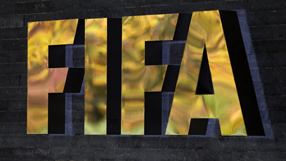British FIFA vice-presidency could be abolished
Britain's automatic and long-established vice-presidency of FIFA is now an anachronism and the time might be right for it to be abolished, said English FA chief executive Alex Horne.

He was backed by his counterpart in the Scottish FA, Stewart Regan, who agreed that having an established seat at FIFA's top table representing just England, Scotland, Wales and Northern Ireland, was no longer relevant or fitted with modern governance practices.
"We are open-minded about it. If you look at it objectively it is quite anachronistic and I wouldn't fight tooth and nail to keep it if I'm honest," Horne, in Istanbul for the annual UEFA Congress, told Reuters:
"I'm not sure there's a great benefit in keeping it - if we give it up in the right way there will be a little bit of goodwill, and if we talk to UEFA what that means is there could be an extra UEFA seat [on FIFA]."
Regan added: "I think the time has come for the seat to be given up, I cannot see how it best serves our purposes today when we could have more influence elsewhere."
FIFA has seven vice-presidential seats representing the six continental confederations and Britain.
Britain's position dates back to 1946 after a Britain v Rest of the World match was played at Hampden Park raising 35,000 pounds which put FIFA back on its feet financially after World War Two.
However, FIFA is under-going a major review of its statutes and German Theo Zwanziger, leading the reforming task force, has earmarked the British vice-presidency as an outdated privilege
Get FourFourTwo Newsletter
The best features, fun and footballing quizzes, straight to your inbox every week.
Of far more importance to the British nations is retaining their influence on the International Football Association Board (IFAB), the game's law-making body.
"As far as IFAB goes that's much more important to us - the status of IFAB and the conservatism around controlling the laws of the game and the sanctity with which we believe the laws should be protected," Horne said.
The British associations formed IFAB in 1886, some 18 years before FIFA came into existence. FIFA then joined IFAB in 1913.
"Contractually we do believe we have a position on this - we entered into IFAB first and FIFA then joined us," Horne added
"We feel a lot more strongly about IFAB and if there are sensible conversations to be had about composition then we will listen to them."
